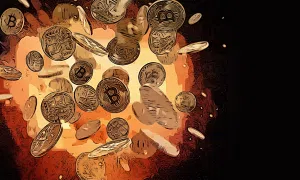Apple has updated the App Store guidelines with new rules regarding NFTsAn NFT or non-fungible token is a digital certificate attached to a unique object. Each NFT is unique and exists in a single copy, it cannot be shared, and all information about its author, buyer, and all transactions with it is securely stored in the blockchain. and crypto applications (especially for Web3 games).
“Apps may use in-app purchase to sell and sell services related to non-fungible tokens (NFTs), such as minting, listing, and transferring. Apps may allow users to view their own NFTs, provided that NFT ownership does not unlock features or functionality within the app. Apps may allow users to browse NFT collections owned by others, provided that the apps may not include buttons, external links, or other calls to action that direct customers to purchasing mechanisms other than in-app purchase,” the message says.
At the same time, apps cannot use their own mechanisms to unlock content or features, such as license keys, augmented reality tokens, QR codes, cryptocurrencies and cryptocurrency wallets, etc.
Apps can make it easier to transact or transfer cryptocurrency on an approved exchange, as long as they are only offered in countries or regions where the app has the appropriate licensing and permissions to provide a cryptocurrency exchange.
The brand new newsletter with insights, market analysis and daily opportunities.
Let’s grow together!
What this means for Apple users (and beyond)
The main points were explained by the former founder of Spring Labs and angel investor Daniel Mason in his Twitter.
In his opinion, in this way Apple demonstrates its desire to work with cryptocurrency applications (especially games), but on its own terms. The Cupertino giant wants to get more money by allowing NFT purchases through IAPs, banning external links, and limiting cryptocurrency purchases to licensed exchanges.
- Games can enable NFT buying in-app purchases. So developers can leverage IAP (30% Apple fee) to sell NFTs or offer NFT services (minting, listing, transferring). This paves the way for NFTs as the gateway into crypto for mobile players.
- Games can’t use other purchase methods or redirect users to other sites. This makes it hard for other providers to plug in and capitalize, keeping money in the Apple ecosystem.
- Games can’t unlock features with NFTs/crypto assets. So additional content or functionality in-app must be unlocked with an in-app purchase. Presumably, this could be an NFT purchase, but not an NFT already owned by a player or brought in from another ecosystem.
- Games can store virtual currencies and offer wallets for storing crypto-assets. Possibly through custodial
It is a wallet in which the private keys are managed by a third party, usually a cryptocurrency exchange. and non-custodial wallets
Non-custodial crypto wallets give you complete control of your keys and therefore your funds. They can be browser-based or in the form of hardware wallets..
- Licensed exchanges can facilitate crypto transmissions. This is more clarification, as Coinbase and others obviously offer iOS apps already, but approved exchanges can facilitate crypto transfers. NFTs in this case are not considered crypto.
Summary
Who loses?
- Anyone who tries to compete with Apple for primary or secondary NFT purchases. This includes exchanges (OpenSea, Magic Eden), payment ramps (Moonpay), or others trying to cut into the payment stream.
- Mobile DeFi, given a licensed exchange solution.
Who are the winners?
- Сryptocurrency exchanges will get more clarity to work in the app store.
- Web3 games can use NFT onboarding as a frictionless way to attract IAP users.
- Infra-providers are creating white-label, in-game ecosystem solutions for NFT/tokens.
Meanwhile…
Last Friday, Oct. 21, Singapore’s High Court ruled that NFTs and digital assets can be considered a form of property. The decision comes after the Singapore High Court on May 13 issued an injunction to stop the sale and transfer of ownership of Bored Ape No. 2162, formerly owned by a Singaporean named Janesh Rajkumar. The injunction is said to be the first in Asia aimed at protecting the NFT.
According to court documents, the plaintiff is trying to recover NFT, which was used as collateral for a loan from an anonymous NFT collector named “chefpierre,” who remains missing and unrepresented in court documents.
Although the plaintiff said he bought NFT with the intention of keeping it, he also frequently used it as collateral for borrowing cryptocurrencies from the NFTfi lending platform.
Previous court documents stated that the plaintiff had successfully used NFT collateral for several loans and paid them back. He indicated in the loan agreements that he did not want to relinquish ownership of NFT and would repay the loan in full in order to claim it back.
After the plaintiff failed to pay the “chefpierre” within the agreed upon time frame, the plaintiff asked for an extension, with the lender offering to refinance the loan, and the plaintiff agreed to do so.
According to Singapore law firm Withers KhattarWong, chefpierre breached the extension agreement and foreclosed on the loan, resulting in NFT being released from escrow in chefpierre’s purse.
After this incident, Judge Lee granted the plaintiff’s request to serve the court documents to “chefpierre” via Twitter, Discord, and the “chefpierre” cryptocurrency wallet address.
The new ruling could set a precedent for NFT to be recognized as property in court.






